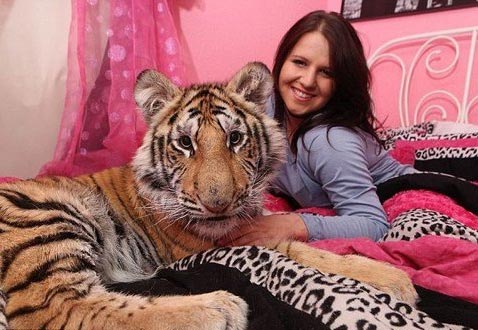当前位置: Language Tips> 英语学习专栏
当你某日去美国旅游,看到街上或是林间小道上有人牵着一只小老虎在遛弯,请不要大惊小怪!因为养大型猫科动物当宠物,在美国已经不是什么稀罕事了。虽然这看起来很酷,但是我们需要思考一些问题:对人类来说,养野生动物当宠物是否安全?对动物来说,这又是否真的是它们的福音?

By Justin O’neill
肖书 注
Florida teen Felicia Frisco loves her cat, Will. She cuddles[1] with him, plays with him, and feeds him. Until his first birthday, Will slept with Felicia every night.
It sounds like Felicia has a typical cat, right? Not quite. For one thing, he’s enormous[2]. When fully grown, he’ll weigh around 500 pounds (226 kilogram).
Will is a Bengal tiger[3].
Cute but Deadly
Six in 10 Americans own some type of pet — a dog, a cat, or maybe a hamster[4]. Such animals are “domesticated,” meaning that, over time, their species has been bred to live among humans.[5] Will, however, is an “exotic[6] pet,” that is, a wild animal. According to some estimates, as many as 18 million Americans own exotic pets, from iguanas to monkeys to kangaroos.[7]
Why would you want to own a wild animal — especially one that could eat you? There are lots of reasons. Owning an exotic pet can be a way to express your personality. For some, these pets are status symbols — a way to show off.[8]
But that can backfire[9]. Just look at Paris Hilton. In 2005, she adopted a kinkajou, a small mammal native to Central and South America.[10] She loved going out on the town with “Baby Luv” — until one day, Baby Luv bit her so deeply that she had to go to the hospital.
Hilton made a full recovery, but she was lucky. Exotic pets can turn on[11] their owners at any moment. The thing about wild animals is...they’re wild. They have instincts we can’t always predict or control.[12] And, exotic pets may carry deadly diseases that spread to humans.
The danger these animals pose isn’t the only problem with keeping them, though. Animal rights advocates say it’s downright cruel to remove animals from their natural habitats.[13] Wild monkeys, birds, and big cats are used to walking several miles per day, not living in a cage or doing circles in someone’s yard.
A Lot of Work
Nevertheless, exotic pets can sometimes make wonderful companions.[14] As professional animal handlers[15], Felicia’s parents are well-qualified to give Will a good life. But not everyone is so knowledgeable.
The fact is, exotic pets are a lot of work and a lot of money. (Felicia’s parents spend hundreds of thousands of dollars on Will every year.) As a result, many owners end up neglecting or even abandoning their animals.
For years, people have been dumping their pet pythons in Florida Everglades when the snakes get too big.[16] Today, their numbers are growing and they are eating more and more natural wildlife. As a result, they are changing the entire ecosystem of the Everglades.
Despite the risks, many Americans are willing to pay big bucks for an exotic pet. According to the U.S. Fish and Wildlife Service[17], 650 million were imported legally from 2003 to 2006. Countless more are smuggled[18] into the U.S. illegally.
As for Felicia and Will? Some experts say a tiger should not share a bed with a person. Zookeeper Jack Hanna compares it to sleeping with a bomb. But Felicia isn’t concerned[19]. She says that raising Will is “kind of like raising a dog.”
Yeah...kind of.
Vocabulary
1. cuddle: (尤指表示喜爱而)抱,拥抱。
2. enormous: 巨大的,庞大的。
3. Bengal tiger: 孟加拉虎。成年的孟加拉虎可以长到2.4米至3米长,重达200公斤左右。它主要以鹿、羚羊和野牛为食,在中国被列为国家一级重点保护野生动物。cat也有“大型猫科动物”的意思。一般情况下人们将大型猫科动物称作“big cat”,以与猫区分开来。但此文作者为了制造一个悬念,所以在第一段时将Will说成是cat。
4. hamster: 仓鼠。
5. domesticated: 家养的,驯养的;breed: 过去分词bred,饲养,培育。
6. exotic: 异乎寻常的。
7. iguanas: 鬣蜥,一种产于南美洲和西印度群岛的大蜥蜴;kangaroo: 袋鼠。
8. status symbol: 地位的象征;show off: 炫耀,卖弄。
9. backfire: (内燃机等)发生逆火,发生回火,引申义是指产生事与愿违的结果。
10. adopt: 收养;kinkajou: 蜜熊,是生活在雨林中的一种浣熊,有锋利的牙齿,以果实为主要食物,但在某些情况下会变得极具攻击性;mammal: 哺乳动物。
11. turn on sb.: 突然袭击某人,恶劣地对待某人。
12. instinct: 本能,天性;predict: 预测,预知。
13. advocate: 支持者,倡导者;downright: 彻头彻尾的,完全的;natural habitat: 自然栖息地。
14. nevertheless: 虽然如此,不过;companion: 同伴,陪伴者。
15. animal handler: 动物训练员,动物驯养员。
16. dump: 抛弃,丢弃;python: 蟒蛇;Florida Everglades: 佛罗里达大沼泽地,是位于美国佛罗里达州南部的亚热带沼泽地,被列为世界上最重要的三个湿地之一。
17. the U.S. Fish and Wildlife Service: 美国渔业与野生动物局,是美国内政部中专门管理渔业、野生动植物及其自然栖息地的国家机关。
18. smuggle: 走私,偷运。
19. concerned: 担忧的,不安的。
(来源:英语学习杂志 编辑:中国日报网英语点津 陈丹妮)
电话:8610-84883645
传真:8610-84883500
Email: languagetips@chinadaily.com.cn